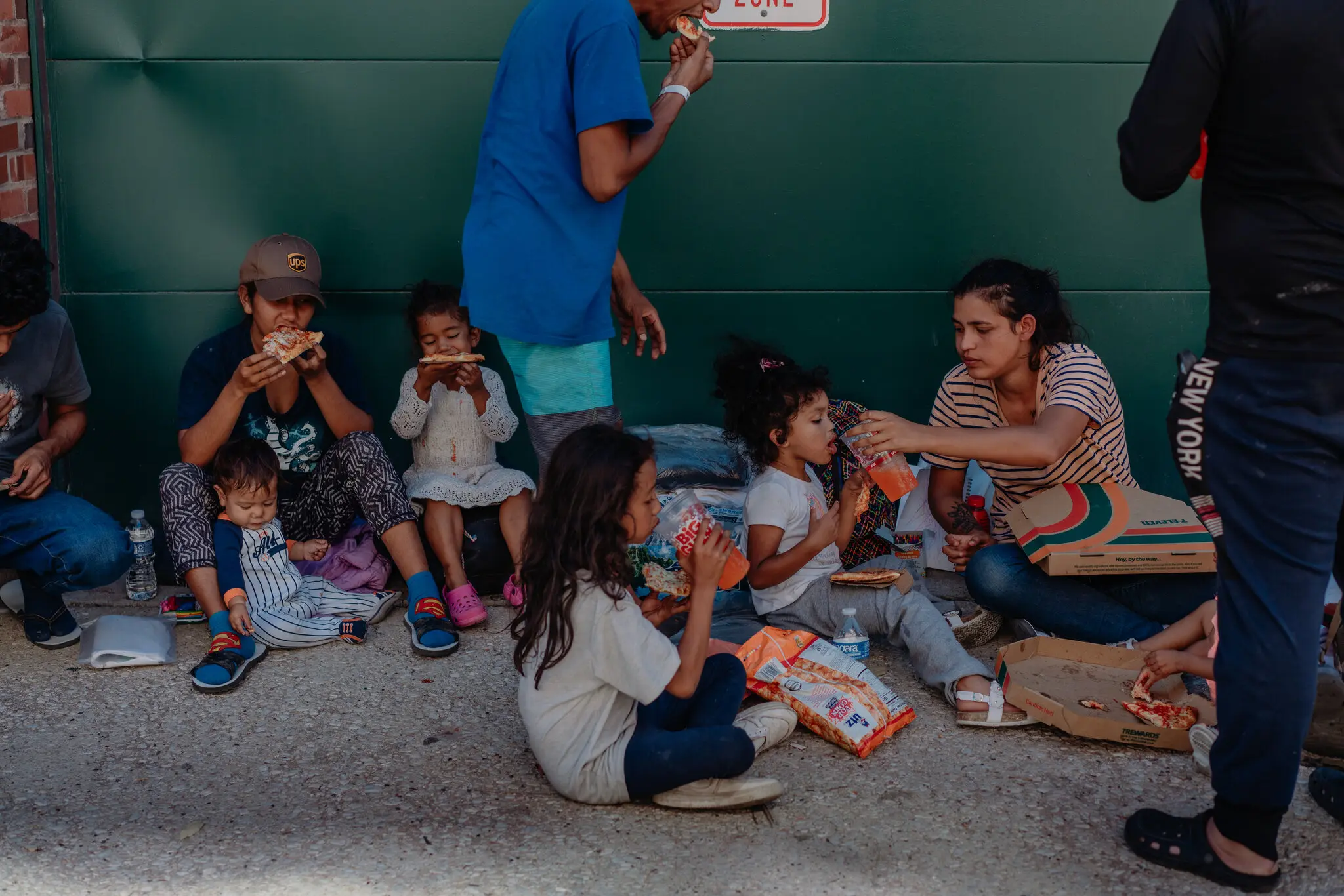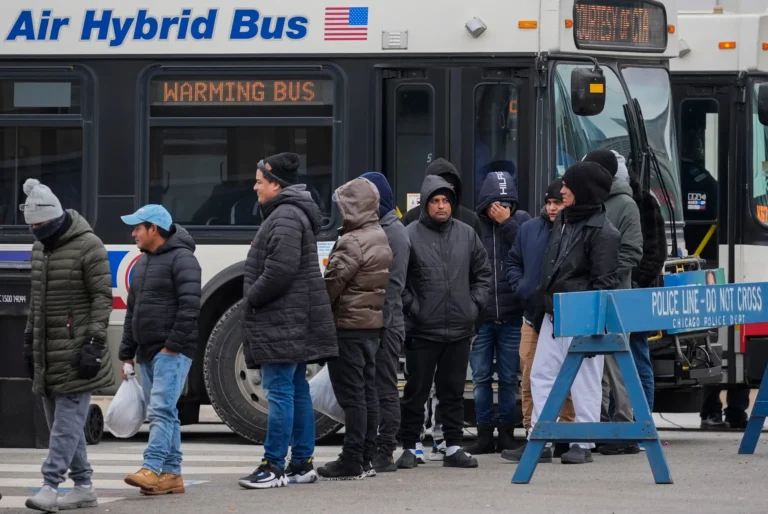In recent weeks, buses have been bypassing the city for its smaller outlying communities, where people are unaccustomed to the flow of newcomers.
In different times, the tiny brick Metra station in the town of Wilmette in suburban Chicago was just a place where commuters grabbed lattes and waited on black metal benches before boarding trains to the city.
These days, it has also become a welcome center of sorts for migrants.
 Large cardboard boxes full of coats, hats and gloves are tidily arranged along one wall. Volunteers are working there daily, accepting donations of socks, puffy North Face jackets, snow pants and bars of soap. When busloads of migrants are dropped off in Wilmette — where their chaperones help them catch trains to downtown Chicago to be transferred to a shelter — they are first met by volunteers at the Wilmette station and given a few essentials.
Large cardboard boxes full of coats, hats and gloves are tidily arranged along one wall. Volunteers are working there daily, accepting donations of socks, puffy North Face jackets, snow pants and bars of soap. When busloads of migrants are dropped off in Wilmette — where their chaperones help them catch trains to downtown Chicago to be transferred to a shelter — they are first met by volunteers at the Wilmette station and given a few essentials.
The migrant crisis in Chicago is intensifying well beyond the city limits. For more than a month, city officials said, buses from Texas have avoided Chicago entirely, dropping hundreds of migrants in suburbs that have been given no warning that they are en route. In December, Chicago enacted penalties for bus operators who drop off passengers outside of designated times and locations or without a permit. The dynamic has played out elsewhere as well, sending some migrants to New Jersey suburbs of New York City.
As the suburban drop-offs near Chicago have grown in number, residents who are concerned about the well-being of the migrants have raised funds and collected supplies. Many municipalities have quickly passed rules limiting buses similar to the restrictions set in Chicago, hoping to stay out of the fray. And some suburban residents are approaching their elected officials with growing alarm, making their feelings clear: We don’t want any part of the migrant crisis.

In Wilmette, a town of 27,000 people where the median household income is about $183,000, dozens of residents have mobilized to help the migrants with clothing and other needs before they board trains for the so-called landing zone in downtown Chicago, where they are then routed to shelters around the city.
Jessica Leving Siegel, a nonprofit marketing consultant, lugged trash bags around the Metra station one evening last week and directed fellow volunteers. Ms. Leving Siegel, who wore a messy bun and a maroon T-shirt printed with the words “We are all refugees,” has organized clothing drives and helped migrants make money by shoveling snowy sidewalks in Wilmette.
“What I would like is for us to become the suburban landing zone,” she said.
Perhaps the town could also find landlords willing to rent to migrant families, she suggested. Or volunteers in Wilmette could open a “free store” modeled after those in Chicago that offer donated items to asylum seekers in need.
If Chicago is overwhelmed by the flow of migrants, Ms. Leving Siegel said, there should be a role for suburban communities, too.
“We clearly have so many people who want to help,” she said. “Instead of just saying, ‘As we shuffle you onto the Metra, we’ll throw a coat on you,’ I think there is a lot more that we could do.”
Mayor Brandon Johnson of Chicago, who leads a city of 2.7 million people, has signaled that he wants other Illinois cities to help accommodate the newly arrived migrants.
On Wednesday, Mr. Johnson said he would like Gov. J.B. Pritzker of Illinois, a fellow Democrat, to set up new shelters for migrants outside of Chicago. While there are already 28 shelters in the city, Mr. Johnson said Chicago’s resources are stretched by the number of new migrants in its care — more than 14,000, at last count — and he has no plans to create more shelters.
“Shelters do not have to solely be set up and built in the city of Chicago,” Mr. Johnson said. “The state can do it wherever they want.”
Oak Park, a city just west of Chicago, has devoted hundreds of thousands of dollars to support migrants, including federal funds, and last week it extended shelter aid for another month. Other suburbs have seemed far less eager to become involved.
Mayor Mike Turner of Woodstock, Ill., said that he felt sympathy for the migrant families who were unexpectedly dropped off in his town in late December and then transported on a commuter train to Chicago, about an hour to the southeast.
But Mr. Turner, who described himself as “a bleeding-heart-liberal conservative” in charge of a diverse city with a sizable Latino population, said the issue came down to resources.
“There’s folks who think, well, maybe we should be doing more,” he said. “We all agree that these people matter because they’re human beings. But we don’t have the ability to manage immigration long term.”
Woodstock, like many other small towns, does not have homeless shelters or a robust government infrastructure that could provide housing or other significant needs to migrants from Venezuela, the country where most asylum seekers have come from.
When Mr. Turner talks to other mayors in the Chicago area, he said, “We all agree that this is not something that we, as smaller municipalities, can manage.”
Mary May, a spokeswoman for the Office of Emergency Management and Communications in Chicago, said that the last bus to drop newly arrived migrants in the city was on the night of Dec. 25. Because it violated city rules about drop-off hours and notification requirements — the bus was impounded, causing some to wonder if bus operators were now reluctant to enter Chicago. A similar phenomenon has played out in New Jersey, as busloads of migrants bound for New York City have been dropped in the suburbs to skirt city rules.
A spokesman for Gov. Greg Abbott of Texas, a Republican who has pressed to send new migrants to cities like Chicago, did not respond to an email seeking comment.
Buses are still allowed to take migrants to downtown Chicago, provided they follow the city’s rules, leading some people to wonder why the suburban drop-offs are becoming the norm.





